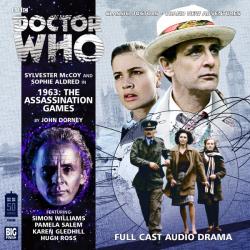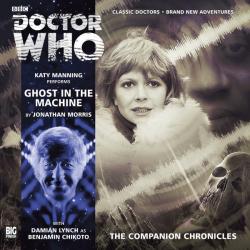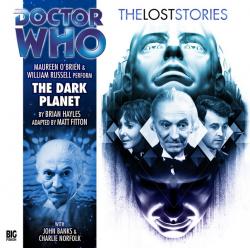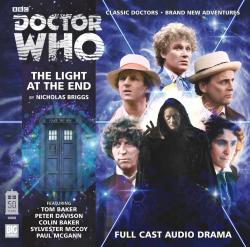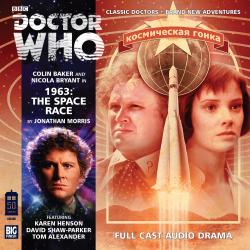The Beginning (Big Finish)
Tuesday, 24 December 2013 - Reviewed by
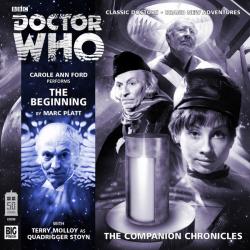
1963: The Beginning
Produced by Big Finish
Written by Marc Platt
Directed by Lisa Bowerman
Released: November 2013
That Marc Platt, scribe of one of the final Companion Chronicles releases, The Beginning, finds time to integrate even Clara Oswald’s presence in his own representation of William Hartnell’s Time Lord and his granddaughter upon their first voyage says plenty of the success with which he crafts a reinterpretation of one of the series’ most ambiguous (untold on-screen) events. Platt’s narrative premise allows for a more direct interaction between the “original” Doctor and the beloved mythology which he was largely detached from due to the show’s executive producers only commencing their weaving in hints of the character’s past in the Jon Pertwee and Tom Baker years.
As one might expect of such a revelatory drama, Platt’s openness in chronicling the protagonist’s escape from his home planet for the most part disintegrates the enigmatic figure that first emerged from the shadows of an abandoned junkyard in An Unearthly Child. Our knowledge of the events which instigated his travels will doubtless transform our perspective on Doctor Who’s televised premiere, yet such is the great flexibility of the programme’s lore and its continuity that we could argue any interpretation of its ongoing or past storylines as valid. That’s an empowering concept if ever there was one, particularly for fans disappointed with the supposedly transparent light in which Platt has attempted to cast a previously elusive episode in the Doctor’s life.
With Carole Ann Ford returning to the Companion Chronicles series, of course, there was scarce chance that Platt’s script wouldn’t be done justice in the recording studio. While few would deny that being able to have the late Bill Hartnell with us to aid in the description of his Doctor’s learning the ways of the universe firsthand, Carole’s narration more than compensates, the script allowing her to create an immediately engaging first-person representation of the characters, locales and events which Susan encounters as she ventures out of a Type 40 time capsule. Much as time has scarcely affected the strength of Who, so too does Carole’s portrayal of Susan and several of The Beginning’s other characters appear unfazed by the decades that have passed since The Dalek Invasion of Earth.
Carole’s co-star Terry Molloy naturally needs no introduction, his return to the role of Davros alongside Sylvester McCoy in Daleks Among Us remaining one of this year’s most memorable guest performances. Quadrigger Stoyn is certainly an inspired deviation from the status quo for Molloy, an unhinged Time Lord engineer who inadvertently becomes a co-conspirator in Theta Sigma’s theft and escape from Gallifrey. However, in this first instalment of a Companion Chronicles trilogy based around Stoyn, the accomplished star’s portrayal is limited by his inevitably gradual character arc, and when he ventures into the roles of other male characters such as the Archeon leader, there’s déjà vu lying in wait, as Molloy’s portrayal of extraterrestrials rapidly becomes reminiscent of a certain Dalek creator of old. Perhaps the transpiration of such an event was impossible to avoid, for Davros’ voice must now be incredibly familiar to the man behind the mask, but if that’s the case, then Big Finish’s neglecting to find another voice for Stoyn is uncharacteristically unambitious on the studio’s part.
Of further minor detriment is the difficult narrative/tonal scenario which must have posed itself to Platt in the early stages of penning his latest Who instalment. In fact, it’s the same difficulty which seemingly arose for George Lucas in drafting his divisive Star Wars prequel outings, and for Peter Jackson with his three-tier Hobbit project. The prospect of discovering the secrets of the past must always appear enticing on the surface, yet with a vast science-fiction mythology already established in the past half-century of time travelling escapades, upon further inspection a great challenge lies in attempting to write a Doctor Who episode which almost breaks the fundamental weekly rules of the series. Just as Lucas couldn’t resist encounters with Wookies, Tatooine and Stormtroopers, nor Jackson trips to the Misty Mountains, the Shire and other fan favourite locales, so too does Platt’s narrative explore human colonies, the ethics of time travel and other familiar Who elements with only a limited level of innovation upon the endless array of intergalactic exploits which have come before.
Like An Adventure in Space and Time before it, The Beginning is a blatant, oft-remarkable homage to Doctor Who’s roots, albeit more engrained in the series’ complex mythology than the former BBC Two docudrama. Platt’s narrative and Carole Ann Ford’s portrayal of Susan are both extremely commendable in terms of their clear endeavouring to distinguish the release from everything which has preceded it. Nevertheless, this reviewer can’t help but notice that a compromise has been struck so as to balance Doctor Who’s past with its present and future. One can appreciate such a compromise in light of the three iconic spirits sent to haunt Scrooge at this time of year, yet had Platt elected to accept the inevitability of this tale’s nostalgic tone, and as such indulge in the past a little more so as to provide a few more gifts for fans in the festive time of goodwill, then The Beginning could be recalled as amongst Big Finish’s all-time greats. There’s potential aplenty, though, for Stoyn’s future encounters with the Doctor, especially if Molloy can capitalize on the unique nature of his role when we next visit his bemused Quadrigger in December’s The Dying Light.
